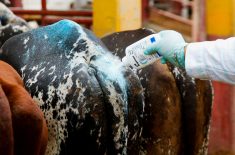Development of a new University of Guelph livestock research centre, expected to model sustainable systems in animal agriculture, will start in the dairy sector.
The university on Wednesday announced plans for the Research and Innovation Centre, Dairy Phase, to be built at Elora, the current site of one of the school’s 14 off-campus research stations, northwest of Guelph.
Construction of the first phase of the new complex, involving both new facilities and renovations, is expected to begin later this year, the university said in a release. Specific costs for this phase weren’t released Wednesday.
Read Also

U.S. not ready to lift Mexican cattle ban over screwworm, Agriculture Secretary Rollins says
The U.S. is not yet ready to reopen its border to Mexican cattle amid an outbreak of the flesh-eating New World screwworm parasite, Agriculture Secretary Brooke Rollins said, but she is pleased with Mexico’s efforts to contain the pest.
Future phases may include research facilities for swine, poultry and beef, the university said.
"This world-class facility will position Ontario at the forefront of innovation and technology development in agri-food, particularly for livestock research," said Rich Moccia, the university’s associate vice-president for strategic partnerships.
"It’s an excellent example of the power of university, government and industry collaboration."
Specifically, the dairy phase will be developed in a partnership between the university, the provincial ag ministry and the province’s dairy industry, through the Dairy Farmers of Ontario.
DFO chairman Bill Emmott, a Brantford-area dairyman, said his group’s involvement "represents a firm commitment to collaborative research with our industry, government and university partners."
The new centre is expected to provide 25 full-time jobs at Elora, offering "cutting-edge technologies and infrastructure" and bringing together scientists from several disciplines to study rural/urban environmental, social and economic issues.
Research at the new centre is expected to cover human health; food safety; animal welfare, productivity and reproduction; new products and procedures; and bio-engineering and renewable energy.
The centre is also expected to use resources such as feed, water and energy more efficiently, and to spur development of new "rural knowledge centres" for bio-based products and green technologies, the university said.
The partnership between the university and ag ministry on projects such as this "promotes a research culture that contributes economically, environmentally and in human capital to Ontario," Moccia said.










